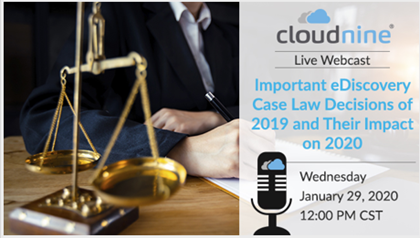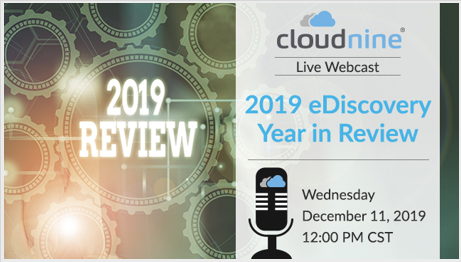2019 eDiscovery Case Law Year in Review, Part 2
As we noted yesterday, eDiscovery Daily published 66 posts related to eDiscovery case decisions and activities over the past year, covering 56 unique cases! Yesterday, we looked back at cases related to passwords and Fifth Amendment protection, non-party discovery and mobile and messaging. Today, let’s take a look back at cases related to cooperation, form of production, privilege and confidentiality disputes, social media related disputes and a key case regarding biometric security.
We grouped those cases into common subject themes and will review them over the next few posts. Perhaps you missed some of these? Now is your chance to catch up!
It’s also worth noting that Tom O’Connor and I will once again be discussing some of these cases – and what the legal profession can learn from those rulings – on our webcast on Wednesday, January 29th – Important eDiscovery Case Law Decisions of 2019 and Their Impact on 2020 at noon CT (1pm ET, 10am PT). The webcast is CLE accredited in selected states, so come check it out!
BIOMETRIC SECURITY
When a 14-year old takes a class trip to Six Flags and his fingerprint is biometrically captured without parental approval, a lawsuit ensues. This case might have had a different result in 47 other states as only three states (Texas and Washington, in addition to Illinois) have biometric security laws:
Illinois Court Says Biometric Fingerprint is Violation of Privacy, Even Without Injury: On January 25, the Illinois Supreme Court rejected an argument from a popular theme park that would have limited a state law that requires consent for the use of facial recognition and other biometrics. The January ruling involved Six Flags, which allegedly fingerprinted a 14-year-old visitor without parental approval. Contesting the case, Six Flags argued it couldn’t be held liable unless the plaintiff demonstrated a tangible injury from the unauthorized collection, often a difficult task in privacy lawsuits.
COOPERATION
Technically, you could argue that all cases involve a lack of cooperation on discovery. But, this case – where an attorney sought sanctions against another for hanging up on him – is a unique example of lack of cooperation:
Court Denies Sanction Request for Attorney Who Hung Up on Opposing Counsel One Time: In Ewing v. Aliera Healthcare, California Magistrate Judge Linda Lopez denied the plaintiff’s motion for sanctions for “rudely and unprofessionally” hanging up on the plaintiff during a call that defendant’s counsel made to the plaintiff to cancel a meet and confer appointment.
FORM OF PRODUCTION
We certainly didn’t see near as many form of production disputes as last year, where we had ten cases dealing with the issue in 2018. Here is one such case from 2019:
Court Denies Defendant’s Motion to Compel Production of Documents and Metadata: In Washington v. GEO Group, Inc., Washington District Judge Robert J. Bryan denied the defendant’s Motion to Compel Production of Documents and Metadata, ruling that the defendant “fails to identify a specific response for production to which the State did not respond”, that the defendant “has not shown that the [metadata] is relevant and proportional to the needs of the case” and that the “the parties have not met and conferred as to this recent log as required under Fed. R. Civ. P. 37(a)(1).”
SOCIAL MEDIA RELATED CASES
There are always a handful of cases each year related to discovery of social media data. However, this year we had two social media related cases of a different sort – involving judge “friending” of participants in litigation (one party, one attorney – that one was technically a 2018 ruling, but we covered it last year). Oh, and a photo on social media can be discoverable simply because you’re “tagged” in it. Here are five social media related cases:
Relying on Interpretation of the SCA, Appeals Court Reverses Subpoenas Against Facebook: In Facebook, Inc. v. Wint, the District of Columbia Court of Appeals, stating that “[t]he plain text of the SCA (Stored Communications Act) thus appears to foreclose Facebook from complying with Mr. Wint’s subpoenas”, concluded that the appellee “has not established the existence of a serious constitutional doubt that could warrant application of the doctrine of avoidance” reversing the trial court’s order holding Facebook in civil contempt for refusing to comply with subpoenas served by appellee Daron Wint.
NY Appeals Court Extends Discoverability of Social Media Photos to “Tagged” Photos: In Vasquez-Santos v. Mathew, the New York Appellate Division, First Department panel “unanimously reversed” an order by the Supreme Court, New York County last June that denied the defendant’s motion to compel access by a third-party data mining company to plaintiff’s devices, email accounts, and social media accounts, so as to obtain photographs and other evidence of plaintiff engaging in physical activities and granted the defendant’s motion.
Judge’s Facebook Friendship with Party Causes Decision to Be Reversed and Remanded to Different Judge: In the case In Re the Paternity of B.J.M., the Court of Appeals of Wisconsin, concluding that “the circuit court’s undisclosed ESM connection with a current litigant in this case {by accepting a Facebook “friend” request from the litigant} created a great risk of actual bias, resulting in the appearance of partiality”, reversed and remanded the case for further proceedings before a different judge.
Court Sanctions Plaintiff for Spoliation of Facebook Account: In Cordova v. Walmart Puerto Rico, Inc. et al., Puerto Rico District Judge Aida M. Delgado-Colon granted in part and denied in part the defendant’s motion to dismiss for fraud on the Court, denying the defendant’s request for dismissal, but imposing a sanction of adverse inference regarding the content of the plaintiff’s Facebook page and her deletion of the related account. Judge Delgado-Colon also ordered the defendant to “submit a proposed adverse-inference jury instruction to that effect before trial.”
Another Case of Judicial “Friending”, But with a Different Result: “Should a judge be disqualified from a case based solely on a Facebook friendship with one of the attorneys?” The Florida Supreme Court recently answered the question in the negative in Law Offices of Herssein & Herssein, P.A. v. United Servs. Auto. Ass’n, when it held that “an allegation that a trial judge is a Facebook ‘friend’ with an attorney appearing before the judge, standing alone, is not a legally sufficient basis for disqualification.”
PRIVILEGE AND CONFIDENTIALITY
We always have a handful of cases involving disputes regarding privilege and confidentiality and this year was no different. One of those cases was certainly unique in that it involved “clawback” of an inadvertent disclosure of privileged ESI (which was granted), but the inadvertently disclosed ESI was still used to determine sanctions against that party. Here are five cases that dealt with privilege and confidentiality disputes:
Court Rules That Privilege Assertion and Potential Fraud Don’t Mix: In Gates Corp. v. CRP Indus., Inc., Colorado Magistrate Judge Kristen L. Mix overruled the Defendant’s Objection to Report and Recommendation of Special Master on Gates Corporation’s Motion to Pierce Attorney/Client Privilege and proceeded with the Discovery Master’s recommendation, ordering the defendant to submit for in camera review readable and searchable versions of the documents identified as privileged by the defendant (along with an Excel spreadsheet of the privilege log) to the Special Master for review.
Appellate Court Vacates Order Allowing Plaintiff’s Expert Access to Defendant’s ESI Prior to Privilege Determination: In Crosmun v. Trustees of Fayetteville Technical Community College, the Court of Appeals of North Carolina, holding that the trial court abused its discretion by compelling production through a protocol that provided the plaintiffs’ expert with direct access to potentially privileged information and precluded reasonable efforts by Defendants to avoid waiving any privilege, vacated the order and remand for further proceedings not inconsistent with its opinion.
Wal-Mart is Allowed to Clawback Inadvertent Disclosures, But Still Sanctioned Over What They Revealed: In Bellamy v. Wal-Mart Stores, Texas, LLC, Texas District Judge Xavier Rodriguez ruled that the defendant was entitled to “claw back” the documents it inadvertently produced in the case, but still considered those documents in analyzing the plaintiff’s motion for sanctions and granted that motion to the extent that he ruled that the defendant could not assert any comparative negligence defense in this case, including arguing that the danger (of a pallet being left unattended in the store) was open and obvious.
Court Agrees that Emails Including Counsel Aren’t Privileged Because They Don’t Offer Legal Advice: In Guardiola v. Adams Cty. School District No. 14 et al., Colorado District Court Judge Raymond P. Moore overruled the defendants’ objection to the magistrate judge’s order compelling them to disclose three e-mails that they contended were subject to the attorney-client privilege, ruling that “[t]he disputed e-mails do not directly request or offer legal advice.”
Court Denies Motion to Redact Portions of eDiscovery Teleconference: In Pacific Biosciences of California, Inc. v. Oxford Nanopore Tech., Inc. et al., Delaware Magistrate Judge Jennifer L. Hall denied the defendants’ Motion to Redact Portions of the August 14, 2019 Discovery Teleconference and the related submissions, stating: “The public has an interest in understanding judicial proceedings, even if they have a limited interest in documents submitted in connection with discovery dispute proceedings.”
We’re only halfway done! Tomorrow, we will cover cases related to disputes regarding proportionality vs. relevancy vs. privacy. Stay tuned!
Want to take a look at cases we covered the previous eight years? Here they are:
- 2018: Part 1, Part 2, Part 3, Part 4
- 2017: Part 1, Part 2, Part 3, Part 4
- 2016: Part 1, Part 2, Part 3, Part 4
- 2015: Part 1, Part 2, Part 3, Part 4
- 2014: Part 1, Part 2, Part 3, Part 4
- 2013: Part 1, Part 2, Part 3, Part 4
- 2012: Part 1, Part 2, Part 3, Part 4
- 2011: Part 1, Part 2, Part 3, Part 4
So, what do you think? Did you miss any of these? Please share any comments you might have or if you’d like to know more about a particular topic.

Sponsor: This blog is sponsored by CloudNine, which is a data and legal discovery technology company with proven expertise in simplifying and automating the discovery of data for audits, investigations, and litigation. Used by legal and business customers worldwide including more than 50 of the top 250 Am Law firms and many of the world’s leading corporations, CloudNine’s eDiscovery automation software and services help customers gain insight and intelligence on electronic data.
Disclaimer: The views represented herein are exclusively the views of the author, and do not necessarily represent the views held by CloudNine. eDiscovery Daily is made available by CloudNine solely for educational purposes to provide general information about general eDiscovery principles and not to provide specific legal advice applicable to any particular circumstance. eDiscovery Daily should not be used as a substitute for competent legal advice from a lawyer you have retained and who has agreed to represent you.







